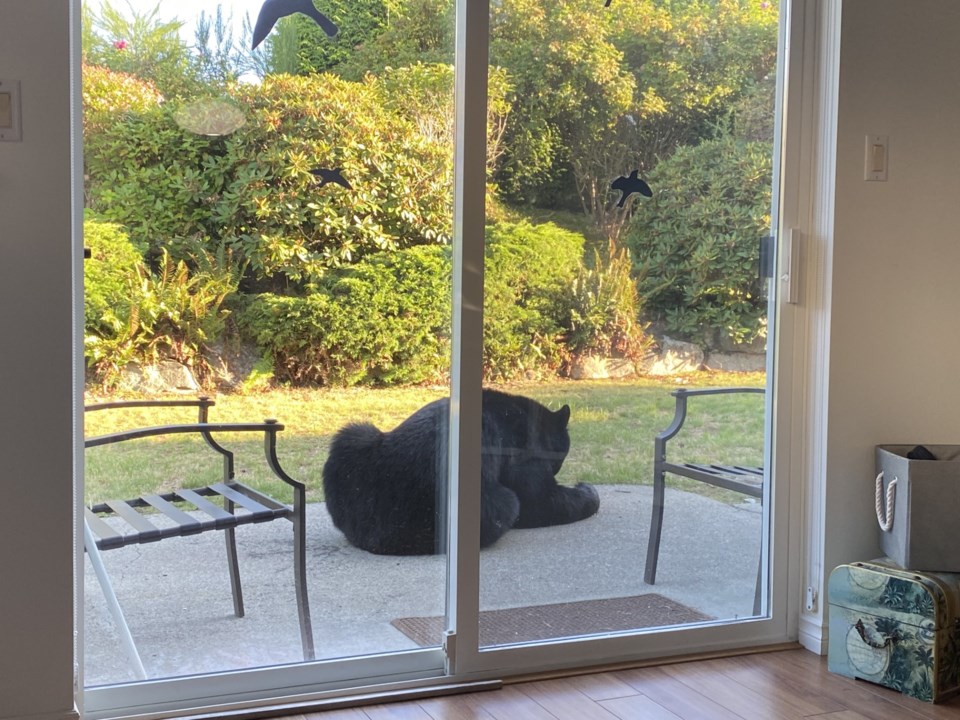As the District of Sechelt deliberated over supporting a black bear cub conflict response, they invited local BC Conservation Officer Service (BCCOS)’s Dean Miller to give his input on the resolution.
The resolution that the District of North Vancouver passed in April asks that the Union of British Columbia Municipalities ask the province to update the BCCOS, Human-Black Bear (Single) Conflict Response Guideline. This would include a review of actions through an independent civilian-led oversight committee and an audit to be done by the solicitor general on BCCOS actions, policies and procedures.
During its Sept. 11 regular meeting (the meeting that followed Miller’s appearance), council unanimously voted to support the resolution.
Providing insight into orphaned black bear response procedure on the Coast, Miller explained that in 2022 the provincial government expanded the permit of three rehabilitation facilities throughout the province, located in Langley, Vancouver Island and Smithers.
Having had a long history with these facilities, it became part of BCCOS’s process when they found an orphaned black bear cub to first alert their provincial biologist and veterinarian, followed by the rehabilitation facilities if the cub was considered viable for rehab, said Miller.
He said having the rehab facility operators attend helped alleviate local conservation officers' workload.
Miller said they are trying to refine their service into more of a public safety service versus being wildlife management agents, which he said happens a lot of the time by proxy as many of their offices are in satellite areas.
Coun. Darren Inkster asked if the number of calls conservation officers receive regarding black bears in Sechelt has increased over the last few years.
In short, Miller said the number of calls in Sechelt has not increased. He speculated this comes from the community being educated and reaching a “proportional goal of coexistence,” adding that they know food availability and people feeding bears is being hidden from them.
Coun. Adam Shepherd asked if there were statistics available on the number of black bear cubs that have been destroyed in the district over the past five years.
Miller did not have district-specific data, but estimated that “one, maybe two” that were related to injury has been killed over the past five years.
Asked what he thinks about the civilian-led oversight committee, Miller said it would be difficult to add another layer on top of their procedures and policies.
He highlighted that wildlife veterinarians and wildlife biologists who have worked in the field for an extended amount of time have laid our their current policies.
“We're always encouraging and incorporating the public, but an oversight committee – I would hope that they would have a firm understanding of our jobs and wildlife behaviour and ecology and all those things,” he said.
Coun. Brenda Rowe asked what factors besides fatal injuries are considered when deeming if a cub is viable for rehabilitation.
Prefacing that the question would be better directed at provincial veterinarians, Miller said conservation officers consult the veterinarians on all cases that are not “gravely obvious” to officers in the field with many species including black bears.
At council’s request, Miller said he would provide statistics on the last decade of black bear calls and responses within the District of Sechelt at a later date.
Throughout the province
On Sept. 9, a B.C. government press release spoke to a new partnership between the province and the Grizzly Bear Foundation. The partnership plans to reduce human-wildlife conflicts and enhance the well-being of grizzly and black bears in B.C.
The press release highlights the leadership First Nations contributed to the shaping of the process, and said, “Direct engagement with First Nations will incorporate Indigenous perspectives, values and traditional ecological knowledge to inform the process and actions.”
A joint government and independent expert panel to explore and identify opportunities for enhanced conservation officer training, and potential improvements to current policies and procedures, is to be created. It is also to look at how to better share information with First Nations, municipalities, stakeholders and other partner organizations.
An independent third-party review committee is to work with the conservation officer service and the provinces’s wildlife branch to develop new or improved policies and procedures and reduce conflict between humans and wildlife.
Jordan Copp is the Coast Reporter’s civic and Indigenous affairs reporter. This reporting beat is made possible by the Local Journalism Initiative.


